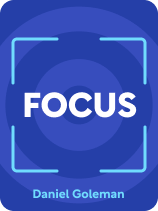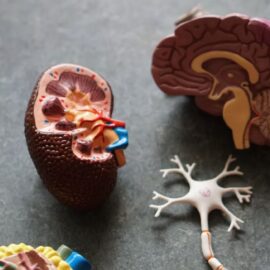

This article is an excerpt from the Shortform book guide to "Focus" by Daniel Goleman. Shortform has the world's best summaries and analyses of books you should be reading.
Like this article? Sign up for a free trial here.
Why is it so hard to focus? What are you missing when you get distracted? How is attention like a muscle?
Daniel Goleman believes that you can improve your attention—by strengthening it with training and restoring it when it’s fatigued. First, you must understand what weakens and disrupts your attention in the first place.
Continue reading to learn why it’s so hard to focus, especially these days.
Why Is It So Hard to Focus?
Why is it so hard to focus? Goleman outlines two main ways in which your attention can be disrupted: distractions and attention fatigue.
Distractions
If you live in a modern society, the demands on your attention are at an all-time high. Distractions are waiting for us at every turn.
(Shortform note: What makes something a distraction or not? Bailey defines distraction as anything that pulls you away from your intended purpose or task. Understood this way, anything can become a distraction if it diverts your attention away from what you want or need to be focusing on.)
Goleman outlines two main types of distractions:
- Emotional, in which emotion takes center stage and interrupts our attention. The stronger the emotion, the greater the disruption it has on our focus. Goleman stresses that emotions are a potent source of distraction.
- Sensory, in which a physical sensation inside our bodies, like pain, or something from the outside environment, like a loud noise, commands our attention. Goleman spotlights how modern technology, especially our personal devices, is a relentless source of sensory distraction and can lead to addictive relationships with digital technology.
| Internal Sensations Cause External Distraction In Indistractable, Nir Eyal provides a different take on distraction—he argues that distressing internal emotional and sensory experiences (like loneliness or pain, for example) are not merely distractions, they are the reason why you become distracted by external things. He explains that external distractions, like the ones digital technology provide for us in abundance, are essentially avenues we use to escape internal physical and emotional discomfort. Without the internal trigger of discomfort, your attention would not be driven to escape into something else like your Twitter mentions or binge-watching television. To be able to resist being derailed by external distractions, you first have to take steps to understand and address the internal emotional and physical sensations driving your distractibility. |
When distractions interrupt our attention, they decrease our ability to use selective attention skills by pulling our focus away. They also interrupt states of open awareness by narrowing our attention to immediate concerns like pain or relationship problems.
(Shortform note: Distractions have this effect on both selective attention and open awareness because of one of the fundamental characteristics of attention: It is finite and indivisible. Bailey explains that this is due to the limited capacity of our working memory.)
The costs of distraction include a tendency to miss important information, poorer learning comprehension, less capacity for empathy, and diminished productivity and performance. Children growing up in our era of technological distraction may be especially at risk for attention problems, such as the inability to complete tasks, follow the logic or arc of a story, or tap into their creativity.
(Shortform note: Goleman focuses on the negative consequences of distraction, but some psychologists note that distraction can have positive benefits, as well. For instance, it can be a tool for coping with mental health challenges and can help you avoid harmful behaviors that might be triggered by intense emotions. It can also help you better manage and cope with difficult feelings over time. Of course, these benefits must be weighed against the harm that distractions might bring to mental health—all the consequences Goleman discusses above can negatively impact mental well-being by disrupting relationships and impeding success.)
Goleman notes that our modern era of relentless distractions and information overload is driving some people to self-medicate in an attempt to improve their focus at school and work.
(Shortform note: Self-medicating for improving your focus can lead to substance misuse and addiction. Sometimes, people even seek prescription stimulants such as Adderall for non-medical reasons and may attempt to obtain a prescription by pretending to have or exaggerating symptoms of ADHD. This is called “doctor shopping,” and it is considered a form of prescription drug abuse. If you or someone you know is struggling with substance abuse or addiction, it is important to seek help from a qualified healthcare professional. There are many resources available to help individuals overcome these struggles, including counseling and support groups.)
Attention Fatigue
Attention, just like a muscle, gets fatigued. Attention fatigue can occur when our brains are exposed to a prolonged or demanding task that requires sustained focus. Distractions, interruptions, sleep deprivation, and stress can also bring about or exacerbate it. When attention fatigue occurs, it becomes more difficult to maintain focus on a task and to process information effectively.
Your attention might need restoration if you notice a decrease in your ability to complete tasks effectively and comprehend what you’re learning, an increase in how distractable you are, or if you’re feeling irritable and impatient.
(Shortform note: The symptoms of attention fatigue are also signs of burnout—a state of physical, emotional, and mental exhaustion that can result from chronic stress, often work-related. Overworking yourself, not getting enough sleep, and not managing stress well contribute to both attention fatigue and burnout.)

———End of Preview———
Like what you just read? Read the rest of the world's best book summary and analysis of Daniel Goleman's "Focus" at Shortform.
Here's what you'll find in our full Focus summary:
- How to understand, strengthen, and use your attention to lead a more fulfilling life
- The three directions you can aim your attention: inward, toward others, and outward
- How spending time in nature restores your attention






